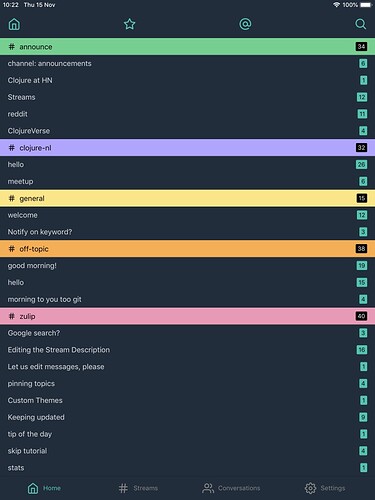last week on…
In my previous post I described how local communities, while once present on Clojurians-Slack, are no longer there. Even more so how the Clojurians-Slack (by becoming more popular) (unintentionally) ‘favors’ a question-answer type of conversation: great for users of Clojure looking for help in the larger channels, not so much for conversations that are needed to get your local community (or your opensource project) of the ground.
Technical reasons behind this ‘favoring’ were briefly described. They come down to the way Slack implements chat (IRC style, unstructured) and messages being deleted after a couple of days (because of our Slack plan).
Clojurians-Slack is a great place for the community
I want to stress this again: Clojurians-Slack isn’t going anywhere; it’s getting more popular and let’s continue doing that.
This post describes a solution for users within the Clojure community that need a different kind of conversation (ie asynchronous). It’s aimed (mostly) at users currently not (or no longer) on Clojurians-Slack, it’s about getting an additional tool in order to expand the community.
Clojure sub communities: let’s meet (again)
…at Clojurians-Zulip.
Clojurians Zulip is an opensource and free chat-platform with unlimited searchable message history and structured conversations.
It’s specifically build for conversations in organizations that work asynchronously:
Part-time organizations like learning communities, standards bodies, advocacy groups, hobby groups, and alumni organizations often need different things out of chat than companies do.
The topic-based threading allows for more focused discussion and makes catching up with conversations easier.
Or as they describe it themselves:
-
Makes the catching-up experience fast and fun, even if a user has been away for a while. On Slack or email, wading through hundreds or thousands of unread messages is taxing at best.
-
Makes it easy to respond to conversations that started hours or days ago, so that users that drop by occasionally can contribute rather than just lurk.
Julia Evans did a great drawing about how it’s differing from Slack channels.
A full list of features can be found here: Features | Zulip
Some (Clojurians-specific) highlights:
- markdown support with syntax highlighting
- mentioning Jira-issues automatically links to them
- articles posted to
/r/Clojure, HackerNews-submissions about Clojure and ClojureVerse-posts are automatically announced (but can be easily muted) - it’s append-only, no messages get deleted (like more systems we know and love)
We think it’s a great fit for the type of conversation that’s currently less suitable for Clojurians-Slack. Especially for smaller groups within our community (meetup groups, small opensource projects) we think Zulip is a great addition.
by and for the community
This is an initiative from Andy Fingerhut, Dominic Monroe and the author. We’re dedicated to get this thing going and make it part of the Clojure community.
So if you’re an owner of a (small) Clojure OSS-project, or involved with Clojure meetup groups (or someone that wants to join their conversation): give it a spin.
Start your own stream and invite others.
Let us know what you think, or what you need.
Thanks for reading,
The Clojurians-Zulip admins,
Andy Fingerhut,
Dominic Monroe,
Gert Goet



